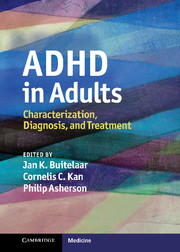Book contents
- ADHD in Adults
- ADHD in Adults
- Copyright page
- Contents
- Contributors
- Preface
- Section 1 The development of adult ADHD as an epidemiological concept
- Section 2 Insights into the pathophysiology of ADHD in adults
- 4 Quantitative and molecular genetic studies of attention-deficit hyperactivity disorder in adults
- 5 Structural and functional magnetic resonance imaging findings in adults with ADHD
- 6 Electrophysiological studies of adult ADHD
- 7 Emission tomography in adult ADHD
- Section 3 Assessment and diagnosis of adult ADHD
- Section 4 Comorbidities of adult ADHD
- Section 5 Pharmacological treatment of adult ADHD
- Section 6 Psychological and social treatment strategies for adult ADHD
- Section 7 Alternative biological treatments
- Appendix 1: Patient organizations for ADHD (countries in alphabetical order)
- Appendix 2: Useful websites for ADHD (in alphabetical order)
- Index
4 - Quantitative and molecular genetic studies of attention-deficit hyperactivity disorder in adults
from Section 2 - Insights into the pathophysiology of ADHD in adults
Published online by Cambridge University Press: 04 April 2011
- ADHD in Adults
- ADHD in Adults
- Copyright page
- Contents
- Contributors
- Preface
- Section 1 The development of adult ADHD as an epidemiological concept
- Section 2 Insights into the pathophysiology of ADHD in adults
- 4 Quantitative and molecular genetic studies of attention-deficit hyperactivity disorder in adults
- 5 Structural and functional magnetic resonance imaging findings in adults with ADHD
- 6 Electrophysiological studies of adult ADHD
- 7 Emission tomography in adult ADHD
- Section 3 Assessment and diagnosis of adult ADHD
- Section 4 Comorbidities of adult ADHD
- Section 5 Pharmacological treatment of adult ADHD
- Section 6 Psychological and social treatment strategies for adult ADHD
- Section 7 Alternative biological treatments
- Appendix 1: Patient organizations for ADHD (countries in alphabetical order)
- Appendix 2: Useful websites for ADHD (in alphabetical order)
- Index
Summary
- Type
- Chapter
- Information
- ADHD in AdultsCharacterization, Diagnosis, and Treatment, pp. 25 - 48Publisher: Cambridge University PressPrint publication year: 2011
- 1
- Cited by



